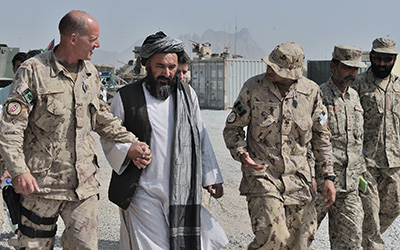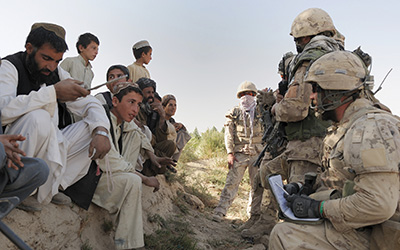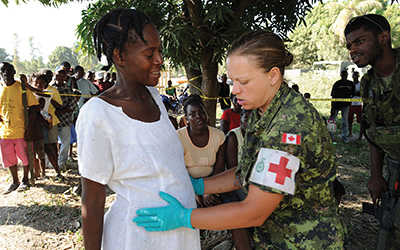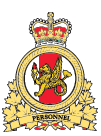Views and Opinions

DND photo IS2010-3023-15 by Corporal Shilo Adamson
Ethics and the Chaplaincy
by Marc Terreau
For more information on accessing this file, please visit our help page.
An article entitled: ‘Is there a Role for CAF Chaplains in Ethics?’ that appeared in Volume 16, Number 1 of the Canadian Military Journal raised a number of ethical issues.
At the beginning of the article, the authors state: ‘During the creation of the Defence Ethics Program (DEP) in 1994, for reasons that still remain unclear, it was decided that military chaplains would not take an active part in the delivery of the new program.’ In 1994, I was the Chief Review Services (CRS). The ethics initiatives that led to the formation of PREP (Protection of Resources and Ethics Program) were of my doing, starting in 1990-1991, and well before the Somalia debacle. It was after 1995 that the name of the program was changed to DEP (Defence Ethics Program). That is why I was somewhat irked by the negative start of the article by Padres Pichette and Marshall. There was no nefarious intent on the part of CRS to disregard the Chaplaincy, as I submit below.
A cursory review of the 7059-29 (CRS) Implementation Plan – Protection of Resources and Ethics Program (PREP), dated 30 June 1994 and signed by the Vice-Chief of Defence Staff (VCDS) on behalf of the Chief of Defence Staff (CDS), would have clarified the incorrect conclusion drawn by the authors. The document clearly outlines the objectives of the program as: ‘A key objective of the PREP will be to raise the awareness of personnel that they have an obligation, which the nation has a right to expect, that Defence resources will not be wasted, abused nor used for personal gain.’ It went on to state: ‘Resource management ethics helps a manager not only to make the right decision but at the same time to ensure that it is seen to be the right decision. ... Resource management ethics is defined as a set of principles to guide each Defence Team Member to ensure that his or her management of Defence or Government resources will withstand the test of public scrutiny.’
The PREP, then the DEP, also pre-date but are aligned with the Values & Ethics codes of the Public Service and what other Government Departments devised for their respective ethos. The focus of the Chaplaincy is on the members of the Canadian Armed Forces (CAF), which is fair and just, but the DEP must also focus upon those of the Defence Team who are not military, and thus the limitations that this imposes on the suggested outcomes.

DND photo IS2010-3019-10 by Corporal Shilo Adamson
At the onset, I wanted to develop a system to prevent ethical accidents that could cause damage to individuals and to the organization. My belief is that ethics and integrity are not just fads, as some cynics would say. Humans have been debating virtuous behaviour and working for the good for at least 2500 years. Yet, we continue to fall short of doing what is required. Why is that? And what can we do to improve our performance? Those were the questions I asked then, and the questions I am still asking.
When looking at ethics as something distinct from a set of values based upon religious tenets I described it as follows: ‘It involves an intellectual process that can help us find the best way to live up to our core values and to our shared values in our social/cultural surroundings.’
Most importantly, with respect to decision-making, I suggested asking four simple questions:
Is it legal?
Is it ethical?
Is it reasonable?
Is it defendable?
Major Denis Beauchamp (PhD), a colleague of mine in the establishment of the Ethics initiative who retired in September of 2013 had written a paper entitled: “Fundamentals of Canadian Defence Ethics” (dated 1999). It is listed as recommended reading under “ethics training and learning tools/suggested reading/government ethics” on the DEP website. http://www.forces.gc.ca/en/training-ethics/suggested-reading.page. In fact, it can be considered the definitive paper on the development of the program.
Those of us who were involved will remember that from very early on in the creation of the ethics program, and fairly frequently after that, some chaplains expressed a belief that either chaplains should take control of or play the lead role in the ethics program for the Canadian Forces (CF). (Editor’s Note: The term ‘Canadian Forces’ has recently been replaced with the tern ‘Canadian Armed Forces.’) It was pointed out that the Canadian Forces Organization Order (CFOO) at the time made them the main, if not the exclusive, advisors to commanders on moral and spiritual matters affecting military personnel and their families. I note that the chaplaincy added the term “ethics” to the role of chaplains when the DEP was formed. The DEP was never meant and did not attempt to replace the chaplain’s role in moral and spiritual matters no more than it would have challenged the role of the Judge Advocate General (JAG) in matters of law. From the beginning, the DEP saw itself as existing and being justified only within the legislative framework of the Canadian Government and its laws.
The thrust was to move away from Abrahamic religions because at the onset, the program focused upon resource management ethics within a legislative framework and dealt with something more specific than the requirements of morality and spirituality based upon religion. The article in Volume 16 Number 1 ‘Is there a Role for CAF Chaplains in Ethics?’ acknowledges that. CRS/DEP deals with – conflict of interest, administrative ethical decision-making, fraud awareness, and so on. These issues affect the whole Defence Team, whether its members have or are without any religious affiliation.
Ethics programs in liberal democracies generally are a relatively recent historical phenomenon dating back only to 1978 with the American “Ethics in Government Act,” followed in 1990 by the Defence Ethics and Fraud Awareness Campaign of the Australian Department of Defence. Ethics is the secular side of the application and practice of values in our democracies, in contrast to morality, which has tended to be the more religious side. Ethics is an integral part of leadership, management, and leadership responsibilities. The ethics programs that were created in Western democracies toward the end of the 20th Century, including the DEP in DND and the CF, were developed to address a vacuum that had existed in that domain concerning the ethical values that should be practiced by personnel. Since that time, the responsibilities of management and senior leadership, in both the public and the private sectors, have been made more and more explicit, responsibilities that include ensuring that personnel know and practice the values that must rule their behaviour in carrying out their duties.
The Air Force Journal article ‘Reflections and Questions on Ethics,’ the Volume 2, Number 2 issue (Spring 2009) expanded upon this theme. It is re-printed in Volume 4, Number 3 (Summer 2015) of the Royal Canadian Air Force Journal.
The DEP has, from the beginning, encouraged military leadership and management at all levels to take an active role in carrying out these “new” responsibilities concerning ethics in the workplace. None of this has challenged in any way the critical role that the military chaplaincy has played and must continue to play in addressing the moral and spiritual needs of military personnel. In fact, in delivering the DEP, a whole person approach to serving the needs of military personnel (i.e. matters pertaining to ethics, morality, and spirituality) would encourage the involvement of the chaplaincy. However, it should be kept in mind that the DEP applies to all CAF and DND personnel as they carry out their duties within the legislative framework of the Canadian Government and its laws, while the chaplaincy should, in a democracy, respect the fact that many today prefer not to deal with chaplains or organized religion.
The article in question does offer an interesting, succinct historical overview of the Chaplaincy in the Canadian Forces/Canadian Armed Forces up to now. From an Ethics program delivery point of view, 2016 is not 1994 by any standard. The Defence Ethics Program of today has developed far beyond the PREP of 1994, and it now includes all aspects of ethics involved in carrying out the mandates of the DND and the CAF. However, as it was back in 1994, it is still just as true today that it is better to work together than at cross-purpose. In today’s environment, Chief Review Services may very well want to consider the observations raised by Padres Pichette and Marshall.
Major-General (Ret’d) Marc Terreau, CMM, CD
Ottawa, Ontario
January 2016
Major-General Marc Terreau CMM, CD, had a lengthy career in air mobility culminating in command of Air Transport Group. A proud graduate of National Defence College, he spent the last six years of his career in National Defence Headquarters as Chief Review Services, where he initiated an ethics program applicable to both the Canadian Forces and civilian members of the Defence Team. Later, he became a consultant on applied ethics, chair of the Ethics Practitioners’ Association of Canada, sat on the Research Ethics Committee of an Ottawa hospital, and was a member of the RCAF Advisory Council and the Honorary Colonel of 429 Squadron. He continues to do volunteer work in various sectors of Canadian society.

DND photo IS2010-6594-02 by Sergeant Bruno Turcotte







